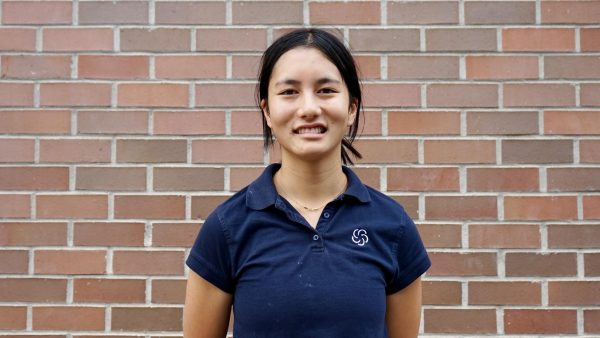Becoming a small business owner is a great idea if you are inspired to grow your own opportunity from your skillset. Katrina Huang (‘26), Natya Chandrasekar (‘25) and Siena De Heer (‘25) are small business owners who share what this multifaceted experience has taught them.
These student business owners got their ideas from their connections and skills. Continuing in their niches for a while, they realized they could share these specialties with a bigger audience. For example, Huang, a drawing instructor for her business Kat Draws, said she began teaching her youngest sister to draw as part of her sisterly duties.
“It’s kind of like the opportunity opened itself up to me,” Huang said, “Art is a passion, and teaching is also a passion of mine, and so it goes hand-in-hand.” Huang went from teaching her youngest sister to teaching her sister’s friends with payment.
A former San Carlos resident, Huang said she reconnected with family friends as she offered her drawing lessons to other family friends there. She now spends her Sunday afternoons teaching drawing to kids in the local public library.
Chandrasekar said she used crafts she learned from her mom and teachers as a kid to raise money for other causes. In 4th grade, she began selling dried lavender in sewn patches to raise money for SEED after it was impacted by a flood that year. Chandrasekar said she has spent many birthdays at SEED, so when the orphanage was distressed, she especially wanted to help. Combining her love for arts and her passion for helping others, Chandrasekar said she has continued to raise awareness and money for causes by selling goods on Nextdoor, a social service for neighborhoods, and setting up a stall outside her house. She however said she does not have a brand name.
“It’s just like some little things along the way, like arts and crafts, that I really enjoyed doing, and it was also a way for me to help others and feel like I was contributing to society,” Chandrasekar said.
Chandrasekar said she also brings her specialty in embroidery to her small business. Chandrasekar learned embroidery in 8th grade from Castilleja middle school teachers Heather Pang and Angelica Ortiz Anguiano.
“My mom and I often sat together and embroidered. My mom was the one who taught me chain stitch, which is a stitch that my grandmother taught her,” Chandrasekar said in an email to Counterpoint.
She has picked it up again since the pandemic, as Zoom lessons have allowed her to embroider under her camera. “The good thing about embroidery is that to me it’s become so intuitive I don’t even focus on the actual art; I can be watching TV and eating a snack and embroider at the same time,” she said.
When the Russia-Ukraine War started, she expanded her business to selling embroidered tote bags to raise money for child refugees.
De Heer also has monetized a craft for her small business. Last year, she started her crocheting business on Etsy in the hopes of gaining financial freedom and enjoying a hobby she learned a few months before. She chose to withhold the name of her business because she said she takes pride in growing her customer base organically.
She said she has made an Instagram account as a source of traffic to her Etsy page.
“I definitely learned that it’s a lot harder than I thought it would be, ‘cause in my head it was just like, ‘oh, I make stuff and then I send it to somebody,’” De Heer said. She said she started with negative income as she purchased crochet supplies and waited for her first orders to roll in.
Similarly, Huang said starting her own business had its difficulties. While she knew each of her students through family friendships, she said she found interacting with the young kids to be difficult.
“One of them stole my sketchbook and then started looking through it,” Huang said. During her experiences of teaching children, Huang has learned patience and realized how she loved teaching children.
Chandrasekar said she has always had difficulty valuing her art, but since she was raising money for other causes, Chandrasekar knew it was justified to raise prices. “Luckily, I found that people in my neighborhood were really receptive to my efforts and most of the time, they wanted to give even more than I was asking for,” she said in an email to Counterpoint.
“I think that when I first started out as a kid, I wasn’t too worried about other people’s perceptions when it came to buying the product just because I didn’t take it personally when someone chose not to purchase something. A lot of the time, people may have just donated to a different cause or aren’t in an ideal financial situation to be donating so I always assume positive intentions when someone doesn’t buy something,” Chandrasekar said in another email.
When it comes to balancing work and school, the student business owners said the latter is always prioritized. Huang only teaches on Sunday afternoons, communicating online with her students during the week. De Heer is currently taking a break from her business because of school. However, she is still strategizing how to continue working. “The work never stops and it’s just like, constantly going, it just has changed from what it was before,” De Heer said. De Heer also said running her business has helped her work ethic.
De Heer, Chandrasekar and Huang created an opportunity to share their hobbies with others, and while entrepreneurship or their respective hobbies may not be what they want to pursue in the future, the skills they learned are great foundational steps.
“I don’t know if creating art for causes is going to be my career in the future, but I definitely think that skills and life lessons I learn from doing it now will help me,” Chandrasekar said.
“It would be great to find an intersection with working with people or working with kids and art or something like that in my studies,” Huang said, “This whole experience has opened up a lot of self-realizations and things like that, like how much I like working with kids, how much I like working with people and bringing communities together.”
“I think it helps with my work ethic, just knowing how to work hard, how to have some responsibility,” De Heer said, “At the beginning, I definitely needed a lot of support from my parents but now I can do it all independently, and I’ve learned how to manage money.”
What these small business owners do has been rewarding. They have started from scratch — perhaps with the help of family— built connections and troubleshooted independently. It is exciting to find out what becomes of their businesses, and I wish them luck in the rest of their endeavors.




